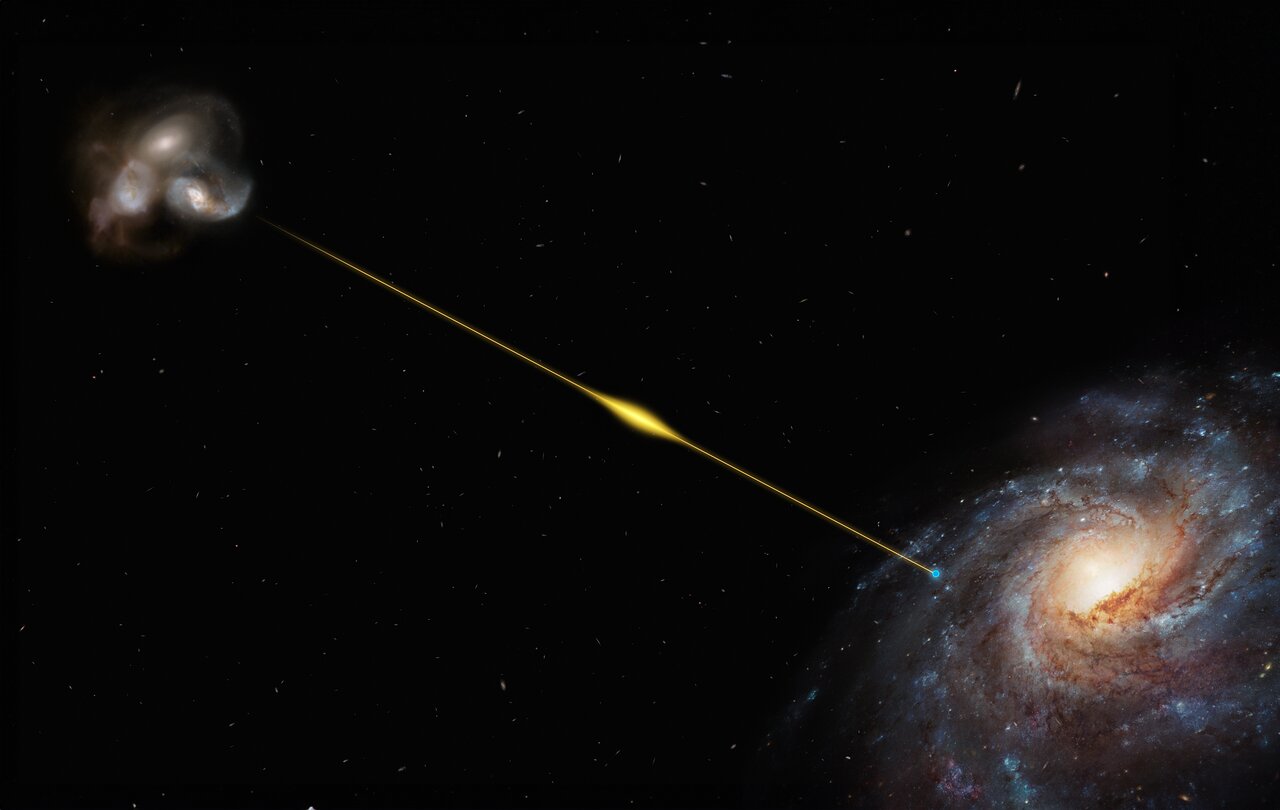
Neutron Star "Glitches" Are Clue to Mysterious Radio Bursts
New observations of a neutron star in the Milky Way's center shed light on what makes mysterious fast radio bursts.

Radio Burst Breaks Distance Record, Challenges Theories
A highly energetic fast radio burst, which broke the distance record, provides a crucial test for theories of these events' origins.

Fast Radio Burst Roundup
They’re powerful, they’re fast, and we aren’t sure about what causes them, but astronomers are closer than ever to understanding the source of mysterious fast radio bursts.

Could Axions Help Fast Radio Bursts Escape a Magnetar’s Grasp?
New research proposes a way for fast radio bursts to escape the confines of a magnetized star and jet out into space — by getting help from theoretical particles called axions.

Mystery Bursts Give Astronomers a View into Galaxy Halos
Flashes of radio waves — whose exact sources are still a bit of a mystery — are helping astronomers learn about the hot gas that surrounds the Milky Way.

New Observations Add Fuel to Fast Radio Burst Origin Debate
A peculiar repeating fast radio burst seems to be coming from a dynamic environment in an otherwise uninteresting region, leaving researchers scratching their heads as to the burst’s origin.

Radio “Heartbeat” Teases Fast Radio Burst Origins
Scientists have observed pulses from a fast radio burst, suggesting the flash might have come from a neutron star.

An Unusual Source Deepens Fast Radio Burst Mysteries
A new source of fast radio bursts raises questions about how much we really know about these mysterious flares.

A Possible Optical Counterpart to a Fast Radio Burst?
What’s the mechanism behind millisecond-duration bursts of radio energy coming from outer space? A team searched for visible-light counterparts to constrain the origin of fast radio bursts — and found one.

Fast Radio Burst's Unlikely Home Puzzles Astronomers
Astronomers have found a fast radio burst — presumably a flash from a young stellar remnant — amongst the ancient stars of a globular cluster, challenging ideas about what produces these enigmatic flashes.

Exploring a Magnetospheric Origin for Fast Radio Bursts
Astronomers are starting to close in on the origins of fast radio bursts — powerful, fleeting flashes of radio waves seen at extragalactic distances.

China’s FAST Observatory Sees More Than 1,000 Radio Bursts from a Single Spot
The largest haul of fast radio burst observations ever recorded, all from a single fast radio burst, is helping astronomers understand what causes these fleeting cosmic phenomena

New Observations Challenge Popular Radio Burst Model
Strange behavior caught by two radio observatories may send theorists back to the drawing board.

Milky Way Magnetar Spits Gamma Rays on Schedule
A Milky Way magnetar surprises astronomers by burping up gamma rays right when their predictions anticipated.

Number of Known Mysterious Radio Flashes Nearly Quadruples
The CHIME telescope has released its first catalog with 492 unique sources of fast radio bursts, the brief flashes of radio waves that have been intriguing astronomers over the past decade.

Fast Radio Bursts Tied to Spiral Arms
New Hubble observations have pinned five enigmatic radio bursts to the arms of spiral galaxies, narrowing down possible explanations.

Magnetars Make Some — Maybe All — Mysterious Radio Flashes
In-depth analysis of a flash of radio waves coming from a Milky Way magnetar have convinced astronomers: Magnetars produce at least some fast radio bursts.

Astronomers Discover a Newborn Magnetar and a New Cosmic Beat
This week, astronomers announce a newborn magnetar and a fast radio burst that's bursting to a beat.

Milky Way Magnetar Makes Fast Radio Burst
Fast radio bursts are mysterious — and powerful — flashes of radio waves. Now, we've found one of these flashes coming from a magnetar in our own galaxy.

New Mysterious Radio Flash Pinned Down; Hundreds More Being Discovered
Recent observations have pinpointed the location of a fifth fast radio burst, shedding light on the environs that create these powerful sources.
